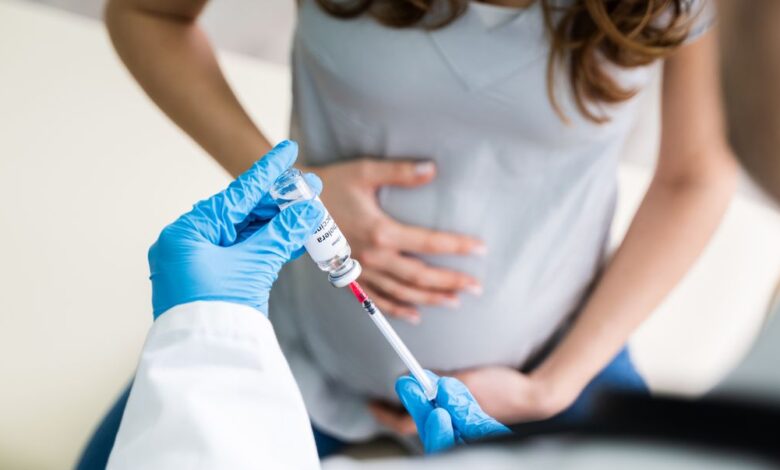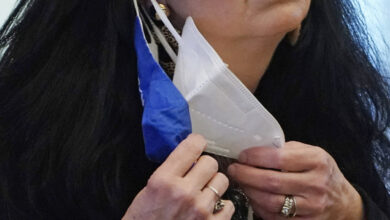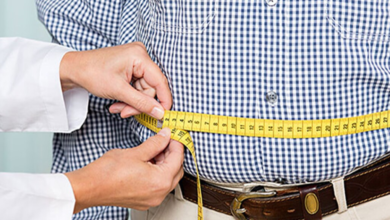What Doctors Want You to Know About the COVID-19 Vaccine and Pregnancy

[ad_1]
- Both American College of Obstetrics and Gynecology (ACOG) and the Society of Maternal Fetal Medicine (SMFM) recommend that the COVID-19 vaccine be made available to pregnant people, while the CDC says pregnancy is a high-risk condition that should be given priority for vaccine distribution.
- Pregnant people who have enrolled in real-time monitoring demonstrations post-vaccine have not raised any major concerns, and myths regarding the COVID-19 vaccine and infertility have been thoroughly disproven.
- Pharmaceutical companies are doing trials on pregnant people now that will provide more information in the future.
With COVID-19 vaccines available from Pfizer, Moderna and Johnson & Johnson — along with the push by President Biden to open up vaccine availability to all adults starting May 1 — many expectant moms are now navigating the conversation about whether or not to get one for themselves. There’s plenty we still don’t know when it comes to the vaccines and pregnancy, and whenever there are gaps in knowledge, misinformation can slip in — like the rumor that the vaccines can cause infertility, a myth that has been disproven. To help families sift through all the information and rumors, I spoke to experts about what we know for certain.
Doctors say most evidence available indicates it’s safe to get a COVID-19 vaccine if you’re pregnant.
Both the American College of Obstetrics and Gynecology (ACOG) and the Society of Maternal Fetal Medicine (SMFM) say that these vaccines should be made available to pregnant people, with the CDC stating that pregnant people should get the COVID-19 vaccine if they choose. The CDC also notes that pregnancy is considered a high-risk condition and should be prioritized when it comes to vaccine distribution.
“For those who might be skeptical about the safety of the vaccine, the Pfizer-BioNtech and Moderna vaccines are not live virus vaccines,” says Christopher Zahn, M.D., ACOG’s vice president of Practice Activities.“We believe, based on the way the vaccines work and early evidence from animal studies, that there’s no indication that there should be any harmful effects to the fetus or female reproduction.” Similarly, the newly available Johnson & Johnson vaccine (also referred to as the Janssen vaccine) is not a live virus either, nor does it have any preservatives or replicate in cells.
The fact that none of the vaccines contain a live or weakened version of the virus is critical, says Robert Atlas, MD, chair of the department of obstetrics and gynecology at Mercy Medical Center. “Live vaccines are not recommended in pregnancy because of the potential risk of actually transmitting the actual disease to the fetus,” he explains. That’s why certain vaccines, like the measles, mumps, and rubella vaccine, aren’t given during pregnancy, but the COVID-19 vaccine can be.
Also promising? The CDC notes that a major part of the Janssen vaccine, called the “adenovirus vector platform,” has also been used for other Janssen vaccines that have been given to pregnant people during all trimesters. This includes participants in a large-scale Ebola vaccination trial. “No adverse pregnancy-related outcomes — including infant outcomes — were determined to be related to the vaccine in these trials,” it reports
And pregnant people who have already had the vaccine aren’t raising any red flags, either. “There are safety monitoring systems to track these vaccines,” Dr. Zahn says. That includes the CDC’s v-safe, which utilizes phone-based texts and surveys to track health problems post-vaccine, he says. V-safe has a registry — which as of mid-February has included some 30,000 pregnant women — and while the CDC says more long-term follow-up is needed, based on self-reported information so far, no specific safety concerns have been observed.
However, while all these indicators look good, there’s still not a ton of data on pregnancy and the COVID-19 vaccines currently available — and neither the Pfizer, Moderna nor Johnson & Johnson vaccines have been tested in pregnant people, ACOG reports. “ACOG strongly advocated for the inclusion of pregnant people in the COVID-19 vaccine trials, so that we would currently have data to fully support the safety and efficacy of the vaccines in this population,” Dr. Zahn says. “Unfortunately, that didn’t happen.”
No, the COVID-19 vaccine won’t affect your fertility.
Experts say that, with the lack of hard, clinical data, misconceptions and concerns about these vaccines have been allowed to flourish.
The most particularly persistent myth out there is that the vaccine causes infertility. To that, ACOG says of all three vaccines in its latest practice advisory that, “Unfounded claims linking COVID-19 vaccines to infertility have been scientifically disproven.” The organization recommends women looking to get pregnant should get vaccinated if they’re eligible.
Of the Pfizer and Moderna vaccines, “while fertility was not specifically studied in the clinical trials of the vaccine,” Dr. Zahn adds, “no loss of fertility has been reported among trial participants or among the millions who have received the vaccines since their authorization, and no signs of infertility appeared in animal studies.”
And of the Johnson & Johnson vaccine, ACOG points out in their advisory that adenovirus vector vaccines, “cannot replicate following administration, and available data demonstrate that it is cleared from tissues following injection. Because it does not replicate in the cells, the vaccine cannot cause infection or alter the DNA of a vaccine recipient and is also not a cause of infertility.”
Myra J. Wick, MD, Ph.D., an OB/GYN and geneticist at the Mayo Clinic, says that she’s heard general concerns from patients about the lack of information. “Women worry about something that hasn’t been studied in pregnancy, and could it cause some kind of damage to my baby or problems with my baby,” she says, noting that patients may also be worried about the impact it could have on them as well. But, she says, “we don’t have any evidence to suggest either one of those things.”
So, should you get the jab?
While all of the information we have so far looks good, the decision still weighs on many families. “I have been scouring the internet, medical publications, etc. but understand there simply hasn’t been enough evidence to give me the full confidence I suspect that I need to move forward,” says Abby C. an account executive who lives in Westchester County, NY and is seven months into her second pregnancy. “At the same time, I’m reluctant to fully decline and move on, as I do have concerns about contracting COVID-19 and believe the vaccine will offer protection against the serious illness, which can impact me as a pregnant woman.”
This content is imported from {embed-name}. You may be able to find the same content in another format, or you may be able to find more information, at their web site.
She’s had conversations with her doctors and says she’s grateful to be able to weigh her options — and that the vaccine is available to her in New York, should she go that route. “In the absence of the vaccine, my family and I have been practicing the strictest form of COVID-19 precautions possible — double-masking, distancing, refraining from social activities, etc. — which has been difficult but beneficial to my pregnancy and has allowed me to maintain my safety up to this point,” she says.
Dr. Wick says that talking about the risks of not getting a vaccine is also key. “We know that women who contract COVID during pregnancy are at increased risk for needing hospitalization and ICU care and even needing intubation,” she says. “And that risk is real and we have evidence of that in the literature.”
Jasmine Jacob, MD, MPH, a cardiologist in Tampa, Florida who just gave birth to her second child, received her first dose of the vaccine when she was 28 weeks pregnant. “I felt comfortable having an honest discussion with my doctor about my risk of COVID-19 infection and the risk of the vaccine on me and my baby,” she says, noting that her pregnancies have been high risk. They discussed her job-related exposure — she often sees positive and suspected COVID-19 cases — and side effects, and Jacob did lots of independent research as well.
“There were moments during that conversation where she did say that we do not know all the answers for what might happen or could happen,” she says. “However, despite the unknown, she and I both agreed that based on my situation, the benefits outweighed the risks. It was the right choice for me.”
Robert Atlas, MD, chair of the department of obstetrics and gynecology at Mercy Medical Center in Baltimore offers similar. “I absolutely discuss with [pregnant patients] the risk of getting COVID-19 if they don’t receive the vaccine,” he says. “We know that pregnant patients are more likely to have a preterm birth, have an increased risk of hospitalization secondary to severe COVID-19 and have a higher risk of severe COVID19 requiring ICU admission.”
Abby C. still hasn’t made up her mind, but she says if she doesn’t get the vaccine before delivering her baby in May, “I absolutely plan to get it shortly thereafter.”
We’ll know a lot more soon.
The good news is that there’s lots happening right now that could make the decision easier in the future. Dr. Zahn says Pfizer started a trial in February to evaluate its vaccine in pregnant people. And the New York Times reports that Johnson & Johnson also has a trial in the works.
Then there are registries, like v-safe, that are collecting data. There’s one from the University of Washington, in which Claire Pearson, a nurse in San Francisco who received the first dose of the Moderna vaccine at 12 weeks pregnant, is enrolled. She says she loves data and relies on evidence-based research in her work, so she was happy to join.
And for others, getting the vaccine has proven to be the reassurance they need. Lara Singer, a school and clinical psychologist in Connecticut, received the first dose of the vaccine when she was 24 weeks pregnant. She was torn at first on what to do. But, she did some research on her own and, she says, “I spoke to my OB and two other doctors I highly trust and all three of them advised without a doubt getting the vaccine,” she says, explaining that she knew working in a school and having her older son in school upped her exposure.
“I loved the idea of being protected while pregnant,” she says, “and then having lower risk when the baby is born.”
This content is created and maintained by a third party, and imported onto this page to help users provide their email addresses. You may be able to find more information about this and similar content at piano.io
[ad_2]
Source link





